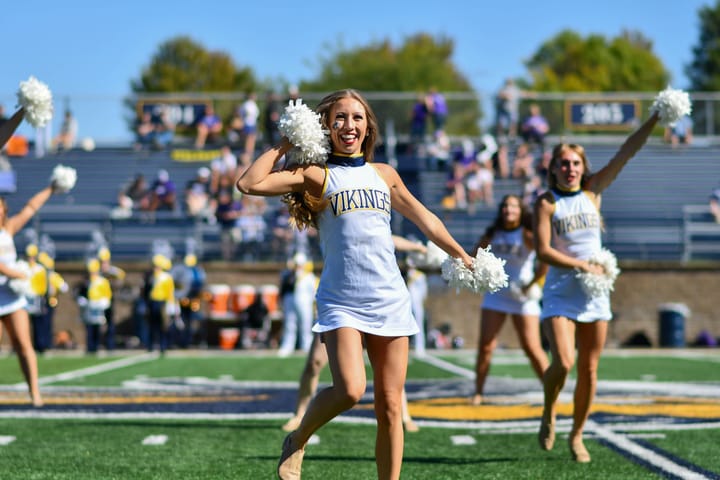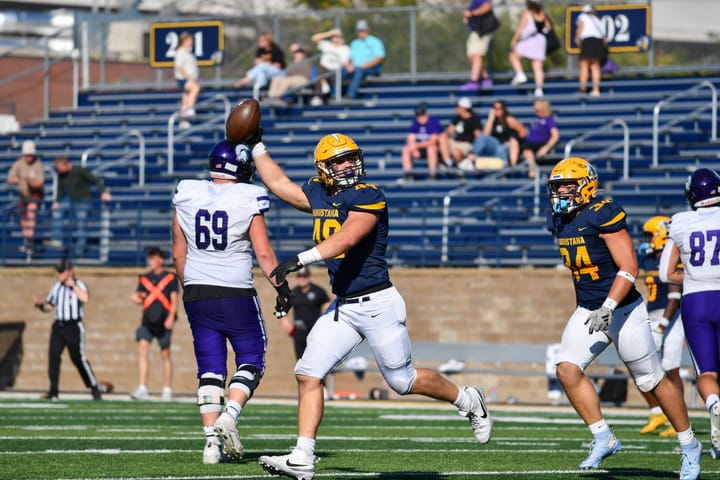Graduate coaches connect players and staff
Tommy Gleason gets to his office in the Elmen Center every morning around 8 a.m. unsure of what the day will bring him. In his small office, there are three desks for other coaches. Today his tasks are to call high school coaches about possible prospects, plan hotels and meals for the weekend and to install a new wheel for the pitching machine.
Gleason, along with other graduate assistants work relentlessly recruiting, planning trips and meals, studying film, making practice plans and doing whatever they can do to help their programs run efficiently —all while taking graduate courses.
A graduate assistant coaching job offers a great opportunity for coaches looking to pursue collegiate coaching or as a way to receive a financial package to pay for graduate school.
“The work everyday can be grueling at times,” says second-year baseball graduate assistant Gleason. “Balancing the expectations we have on the baseball field while being active in the classroom can be difficult.”
The days for Gleason and his colleagues can be long. Graduate assistants will spend up to 20 hours a week in the office, 20 hours on the court or field and another 10 in classwork. The work continues in the summer as they spend time on the road recruiting or hosting camps for Augustana prospects and youth players from around the area.
While working through the transition from player to coach, graduate assistants find a new appreciation for their sport and the number of people it takes to run a program.
“As a player, all you know is game and practice,” says first-year men’s basketball graduate assistant Makaleb McInnis. “You don’t think about all the other factors that contribute to putting the players in the best situation possible at all times.”
McInnis often goes out of his way aiding players with ball handling, shooting drills and other areas of the game away from practice time. After graduating from Black Hills State University, McInnis has already made an impact on his players.
“Coach McInnis means the world to our program,” says sophomore guard Isaac Fink. “He embodies all of the characteristics that our program tries to convey. For being a first-year coach, he does a great job of building personable relationships with each player. And I feel as though I can go to him with anything basketball or life related, and I can trust him to give me great advice.”
Graduate assistants provide a connection between head coaches and athletes since most graduate assistants just finished their playing careers.
“Coach Gleason really has put a lot of time and effort into learning different parts of the game and doing whatever he can to help our program be successful,” said junior pitcher Seth Miller. “He has really helped the catchers this season and his help has really paid off for us.”
Gleason had never caught an inning in his career at Luther College in Decorah, Iowa, but has put in countless hours learning and teaching the catching position. His dedication has helped the catchers and pitchers amass a total of 76 strikeouts through seven games this season.
Although graduate assistants are fully integrated into everything within the program, they receive little recognition. In the coaching community, it is understood that one must work their way up the coaching ladder. However, their hard work does not go unnoticed.
Volleyball graduate assistant Emma Nelson graduated from St. Catherine University in St. Paul, Minnesota, and is in her first season. She helps plan practices, helps recruiting, is involved in drill leadership and execution and travel planning.
“Emma is extremely important to our program,” said head volleyball coach Jennifer Jacobs. “We treat our graduate assistants the same as we treat any full time coach within the program.”
At the end of every season, Jacobs rewards her graduate assistants with a trip to the annual American Volleyball Coaches Association (AVCA) convention and to the NCAA Division One volleyball championships to show her appreciation.
Although Nelson came to Augustana with the dream job of becoming a licensed sports psychologist someday, her mind may be changing.
“I love the idea of helping athletes at all ages overcome mental blocks to help them develop in their athletics,” says Nelson. “However, the more I am introduced to the coaching world, the more I love it.”



